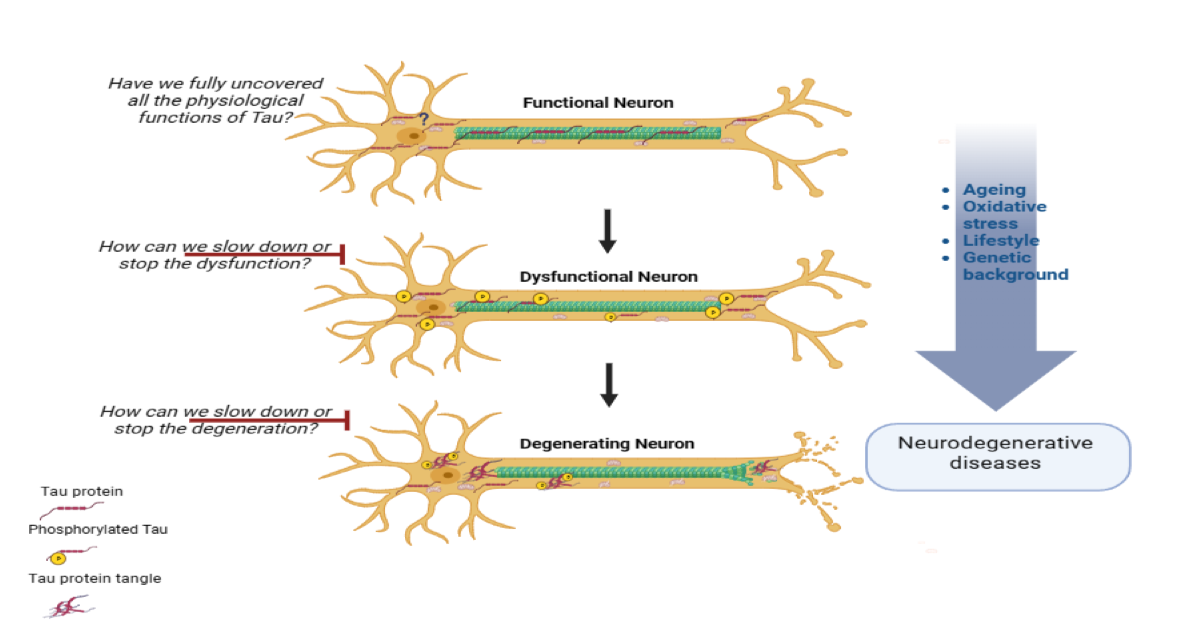Exploring Tauopathy through a Molecular Lens for Comprehensive Understanding
A special issue of Cells (ISSN 2073-4409).
Deadline for manuscript submissions: 30 September 2024 | Viewed by 189

Special Issue Editors
Interests: proteostasis; oxidative stress; tau protein; protein aggregates; mitochondria; mitophagy; neurodegeneration; aging
Special Issue Information
Dear Colleagues,
Tauopathies, which involve dysregulation of the essential neuronal microtubule-associated protein Tau, are the most widespread neurodegenerative dementias and include Alzheimer’s disease (AD), Pick’s (PiD) diseases and others. Unlike the familial frontotemporal dementia with Parkinsonism on 17 (FTDP-17), involving mutations in the MAPT gene, other Tauopathies are characterized as a wild type, hyperphosphorylated Tau isoforms that underlie neuronal dysfunction and neurotoxicity. However, the mechanisms that trigger the transformation of physiological Tau isoforms into hyper-phosphorylated soluble or aggregated species are not well understood but are at the heart of Tau-dependent pathogeneses. For diagnoses and therapies, the critical molecular mechanisms linked with and ostensibly permissive to the progression of Tauopathies from nearly early non-symptomatic to the catastrophic consequences of dementia, also remain mostly undefined.
This Special Issue will focus on the molecular mechanisms of Tauopathies, physiological functions of Tau, uncovering the unique function of each isoform, Tau-related molecular mechanisms that cause early cognitive and synaptic impairments and mechanisms that promote physiological Tau converts to pathological Tau.
Dr. Eleni Tsakiri
Guest Editor
Manuscript Submission Information
Manuscripts should be submitted online at www.mdpi.com by registering and logging in to this website. Once you are registered, click here to go to the submission form. Manuscripts can be submitted until the deadline. All submissions that pass pre-check are peer-reviewed. Accepted papers will be published continuously in the journal (as soon as accepted) and will be listed together on the special issue website. Research articles, review articles as well as short communications are invited. For planned papers, a title and short abstract (about 100 words) can be sent to the Editorial Office for announcement on this website.
Submitted manuscripts should not have been published previously, nor be under consideration for publication elsewhere (except conference proceedings papers). All manuscripts are thoroughly refereed through a single-blind peer-review process. A guide for authors and other relevant information for submission of manuscripts is available on the Instructions for Authors page. Cells is an international peer-reviewed open access semimonthly journal published by MDPI.
Please visit the Instructions for Authors page before submitting a manuscript. The Article Processing Charge (APC) for publication in this open access journal is 2700 CHF (Swiss Francs). Submitted papers should be well formatted and use good English. Authors may use MDPI's English editing service prior to publication or during author revisions.
Keywords
- synaptic dysfunction
- Tau isoforms
- Tau functions
- Tau aggregation
- neurodegeneration
- post-translation modifications
Benefits of Publishing in a Special Issue
- Ease of navigation: Grouping papers by topic helps scholars navigate broad scope journals more efficiently.
- Greater discoverability: Special Issues support the reach and impact of scientific research. Articles in Special Issues are more discoverable and cited more frequently.
- Expansion of research network: Special Issues facilitate connections among authors, fostering scientific collaborations.
- External promotion: Articles in Special Issues are often promoted through the journal's social media, increasing their visibility.
- e-Book format: Special Issues with more than 10 articles can be published as dedicated e-books, ensuring wide and rapid dissemination.
Further information on MDPI's Special Issue polices can be found here.







